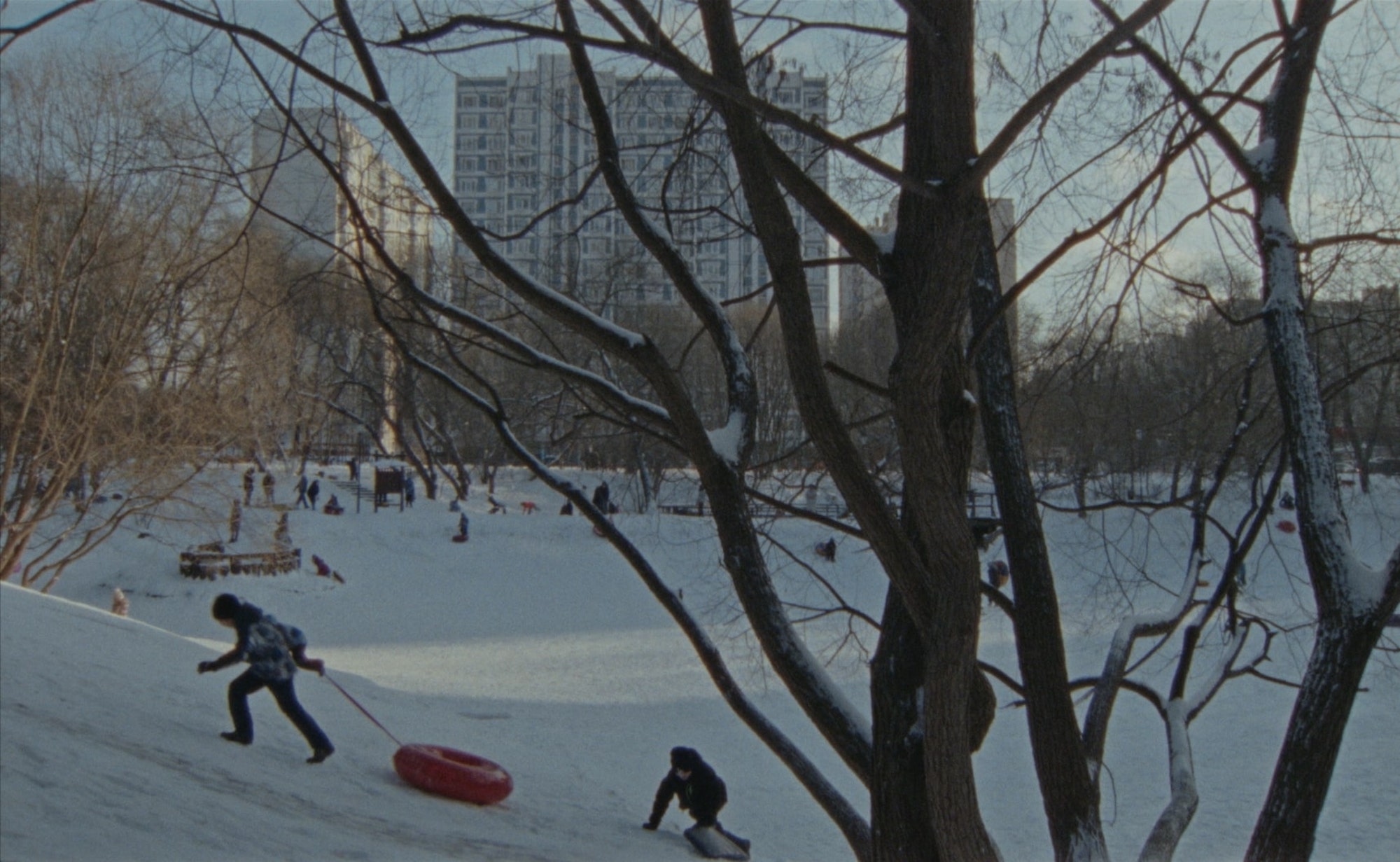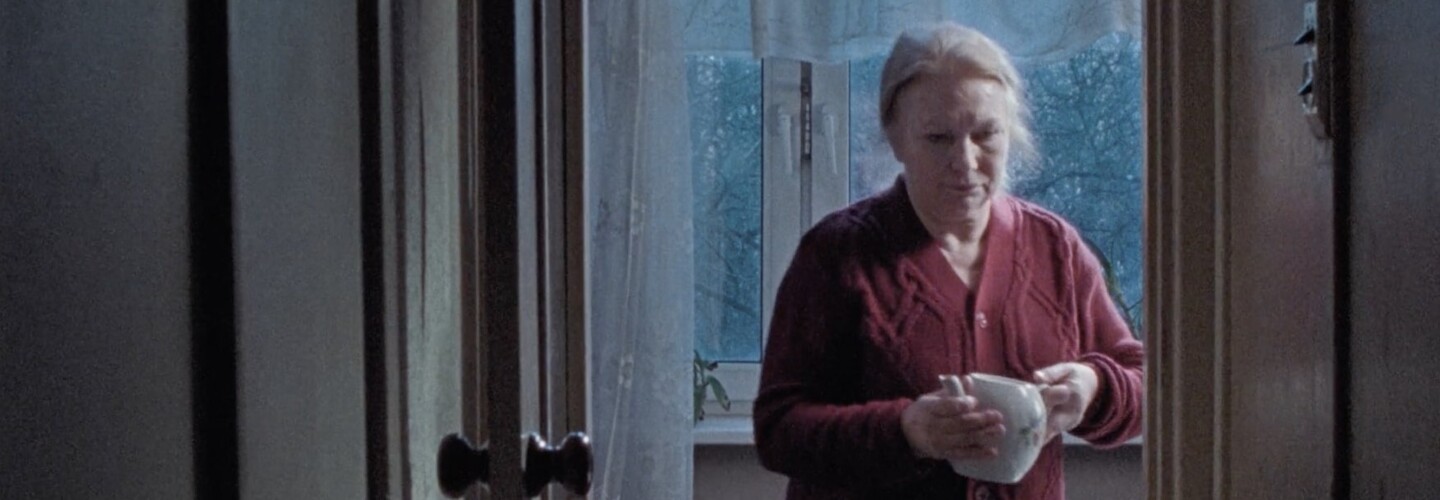
The sun shines while the snow melts. There is a small feeling of hopeful anticipation in the crisply-shot city. But the domesticated and dark interiors tell a far different story — the simple life of Tamara, a primary school teacher. In stark, long, observational shots that betray Director Nastia Korkia’s background in documentary filmmaking, she attends school, teaches class, then is assigned the specific job of overseeing the votes at the Presidential Election. Moving at a slow and methodical pace, Almost Spring (Pochti Vesna) presents the corruption of Vladimir Putin and the United Russia party as a brutal foregone conclusion. The effect is notably chilling, displaying how normalised cheating has sadly become in everyday Russian life. As part of the film’s online premiere here on DN, we asked Korkia to tell us all about shooting on film, recreating the feel of a traditional Russian school and what filmmakers from the region can do to stand up to the degradation of democracy.
Almost Spring tell its story in as few movements as possible. It seems you wanted to strip it back as much as possible. Was this baked into the script from the beginning, or was this feeling something you achieved through a process of elimination?
From the beginning it seemed important to me to tell this simple story as succinctly as possible. Although in the script the distance to the protagonist was often closer, and I described every movement in detail, in the preproduction stage it became clear that we never really get close to the individual, because the most important thing is to show a person fitted into the landscape and circumstances. And both the landscape and circumstances in this story are monolithic, paralysing, and unavoidable.
It was important for me to convey how imperceptibly, and in little details, the system bends a person over for itself.
You previously worked in the documentary space. Is the observational nature of documentaries an inspiration on how you wanted to tell this film, which at times almost feels like a documentary itself!
If the film resembles a documentary, I take it as a compliment. I wanted to achieve the feeling that we dissolve into what is happening and become observers of someone else’s life. In general, what I wanted most of all was to convey the flow of time, its monotony.

There is a very stripped-back feeling to the movie; the movements, the gestures. Everything feels familiar. Was it important to create this kind of atmosphere in order to see how normalised this kind of corruption can be?
It was important for me to convey how imperceptibly, and in little details, the system bends a person over for itself. How little one individual can do when circumstances put pressure on her. For me as a whole this film is about coercion, about the inability to resist and about learned helplessness; the banality of evil.
What I wanted most of all was to convey the flow of time, its monotony.
This extends to the performances themselves. There is an easy, lived-in naturalism. Did you work very closely with the actors to get a specific performance from them?
We rehearsed quite a lot. For example, both the kids in the classroom and the kids who play volleyball are actors. We were making this film when there were strict restrictions due to Covid and we couldn’t just come to the school and shoot someone in a documentary manner. These kids didn’t know each other before the shooting. We played and rehearsed with them long enough that they ended up looking like they were in the same class, but they were actually seeing each other for the first time in their lives.

I thought the ballot-stuffing scene itself was very well-executed, especially as we never see the person actually committing the crime. What was it like creating that scene? Did you know exactly how you wanted to frame it?
We felt that it was crucial to find the right distance in this scene. There was an understanding that the ballot stuffing should not take place in the center of the frame and that it should look as unemotional as possible. In prep I watched a lot of videos of the balloting moment and it was amazing — in reality all these people throw in ballots very calmly, no rush, no visible emotion. We decided that we would allow ourselves only one emphasis on what was going on, with a single camera movement for the entire film.
Tell me about the length of shots. They are relatively long, especially for a short film. How do you know when to cut to the next scene and when to hold the shot a little longer? How do you get a rhythm for them?
It seems that time only manifests itself at a certain length. Space begins to breathe in a special way if you look at it a little longer than usual. I wanted to try to capture the boredom and inevitability of time — the expectation that something would happen.

There is a lovely texture to the film, shot on Kodak Film. Did you always want to shoot on film, especially with regards to how you capture the low light and the “almost spring” feeling of the title? What were the advantages and drawbacks?
From the very beginning our Cinematographer Evgeny Rodin suggested that we shoot on film and I didn’t hesitate for a minute. In our case, this decision was stylistically justified – since the story is very trivial and mundane, we needed to take it out of context a bit, achieve a softness of the image and additionally, through film, stylize what is happening in an abstract time. Everything seems to be happening now, but might not be – this was an important and necessary generalization that we wanted to achieve.
We decided that we would allow ourselves only one emphasis on what was going on, with a single camera movement for the entire film.
For us shooting on film had only two obvious disadvantages – it’s expensive and you have to wait for development. However, it’s impossible to overestimate how shooting on film made me and everyone else on set disciplined and clear-minded.
Almost Spring was made before the war, but the war at times feels like a natural end-point of the authoritarianism and corruption of Putin’s regime and United Russia. The lack of choice feels stultifying.
I think this film has taken on a new dimension since the war began. I hope it gives at least a small sense of the depressed state in which most of Russia’s population finds itself. This frozen and submissive state lasts for quite a long time, and it robs people of the will to resist. Fear eats the soul, as we know.

I see the support from Mosfilm, Moscow Film Commission, etc. Would a film like this be possible today? What can Russian filmmakers, most of them now in exile, do?
Mosfilm in the credits is mentioned because it was the laboratory in Russia where we developed and scanned film. Moscow Film Commission is the organization to which filmmakers apply in order to organize filming in public places in Moscow. So it would be true to say that we didn’t have any real funding or support to make this film; it was impossible even before the war. I shot it with my own money which I earned by directing an ad for PepsiCo. And I am forever grateful to my beautiful team — this film would not be possible without them. Most of the crew worked on pure enthusiasm, I didn’t have enough resources to pay, but there was a sense for all of us that it was important to tell this story.
It’s impossible to overestimate how shooting on film made me and everyone else on set disciplined and clear-minded.
It seems to me that Russian filmmakers today should reflect what is happening in artistic form, not shut ourselves off from the horrific, absurd and criminal reality of our society. At least, I see that as my personal responsibility. I hope that we will find the courage to speak honestly about the war and these dark times in films. And it will be the most uncomfortable but important conversation we can have.
What are you working on next?
I’m trying to make sense of what’s going on and I’m reading a lot: Anna Politkovskaya’s Putin’s Russia, Hannah Arendt’s Eichmann in Jerusalem: A Report on the Banality of Evil and so on. I am getting ready to shoot my next film, but as long as there’s a war going on, not much else matters.


